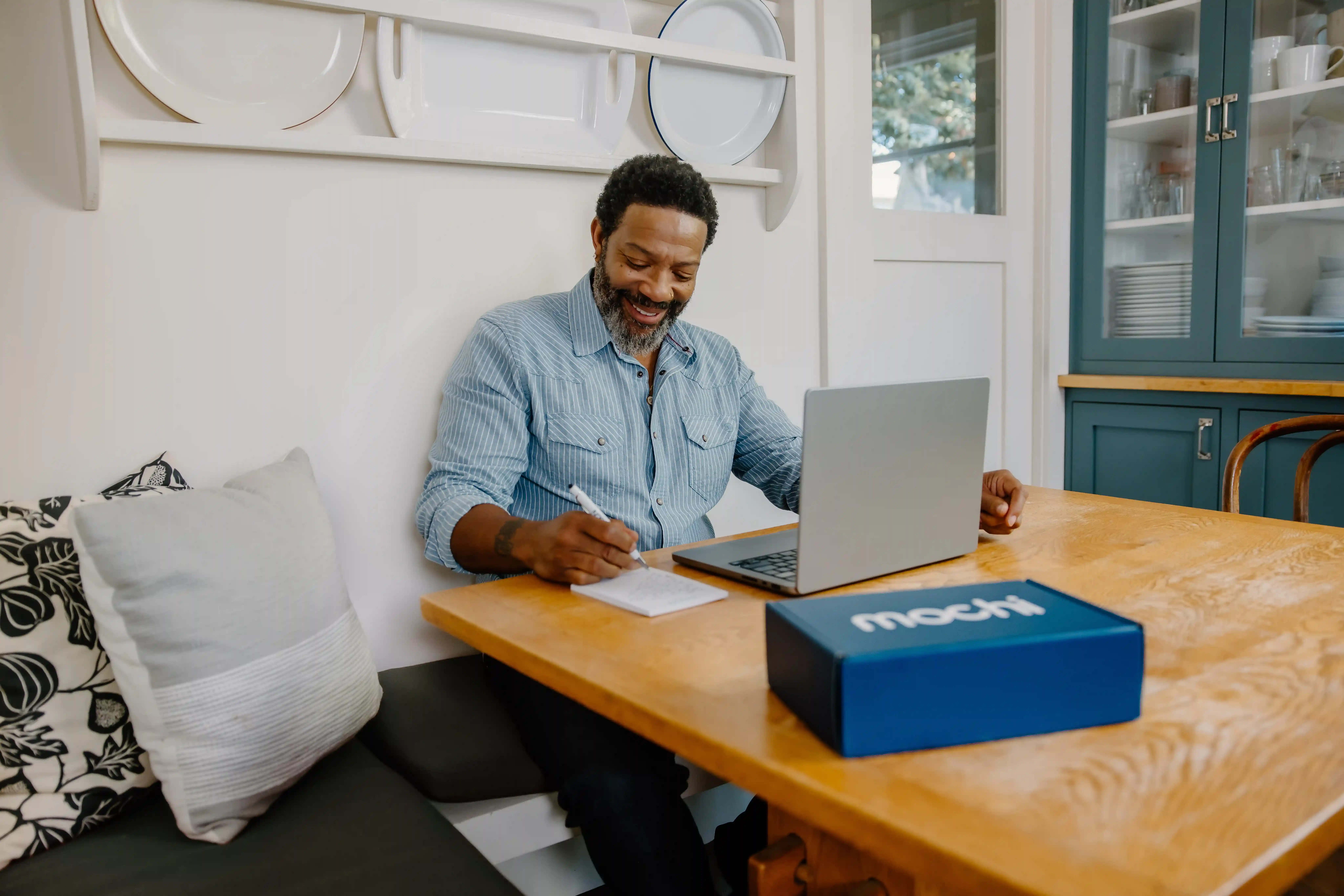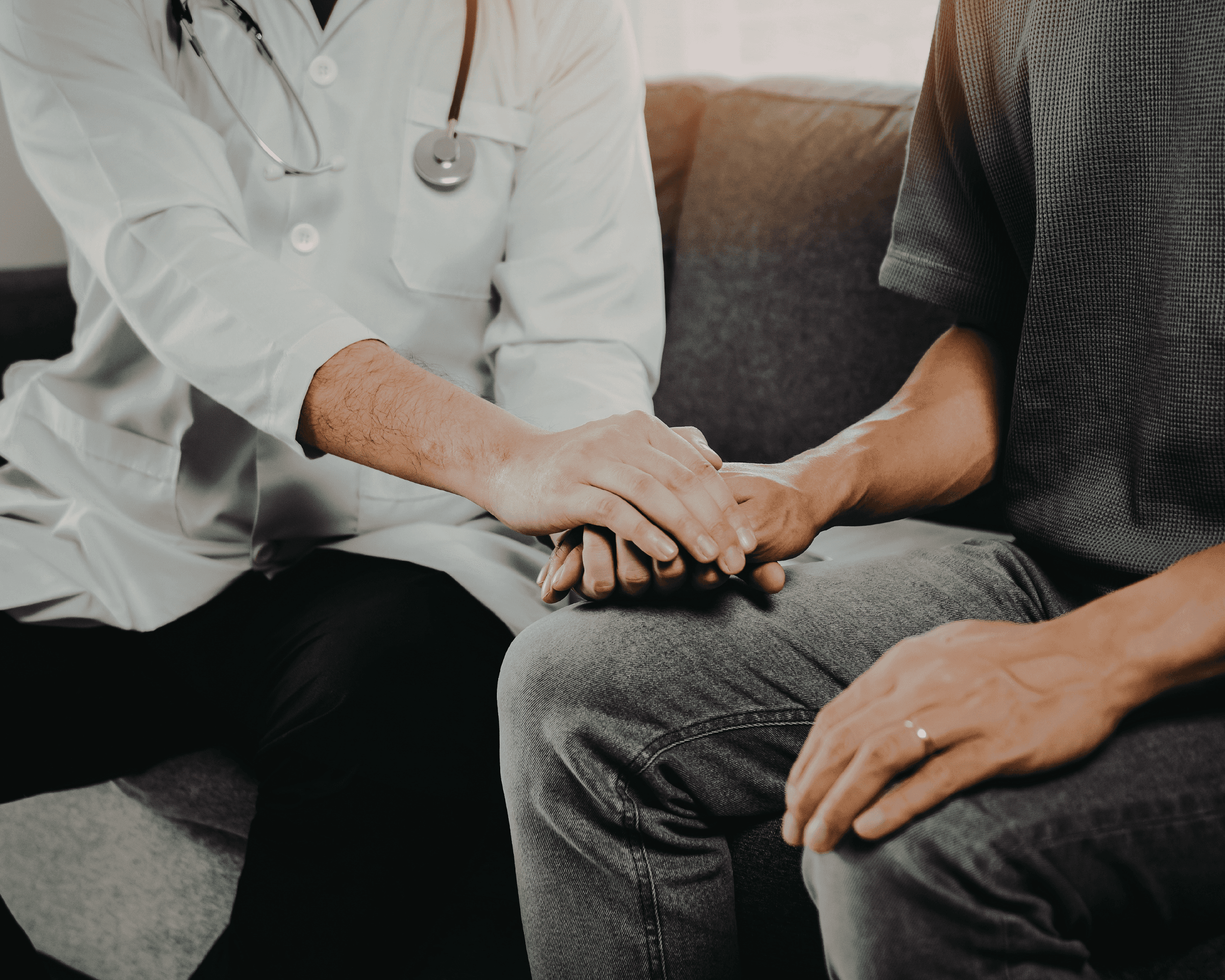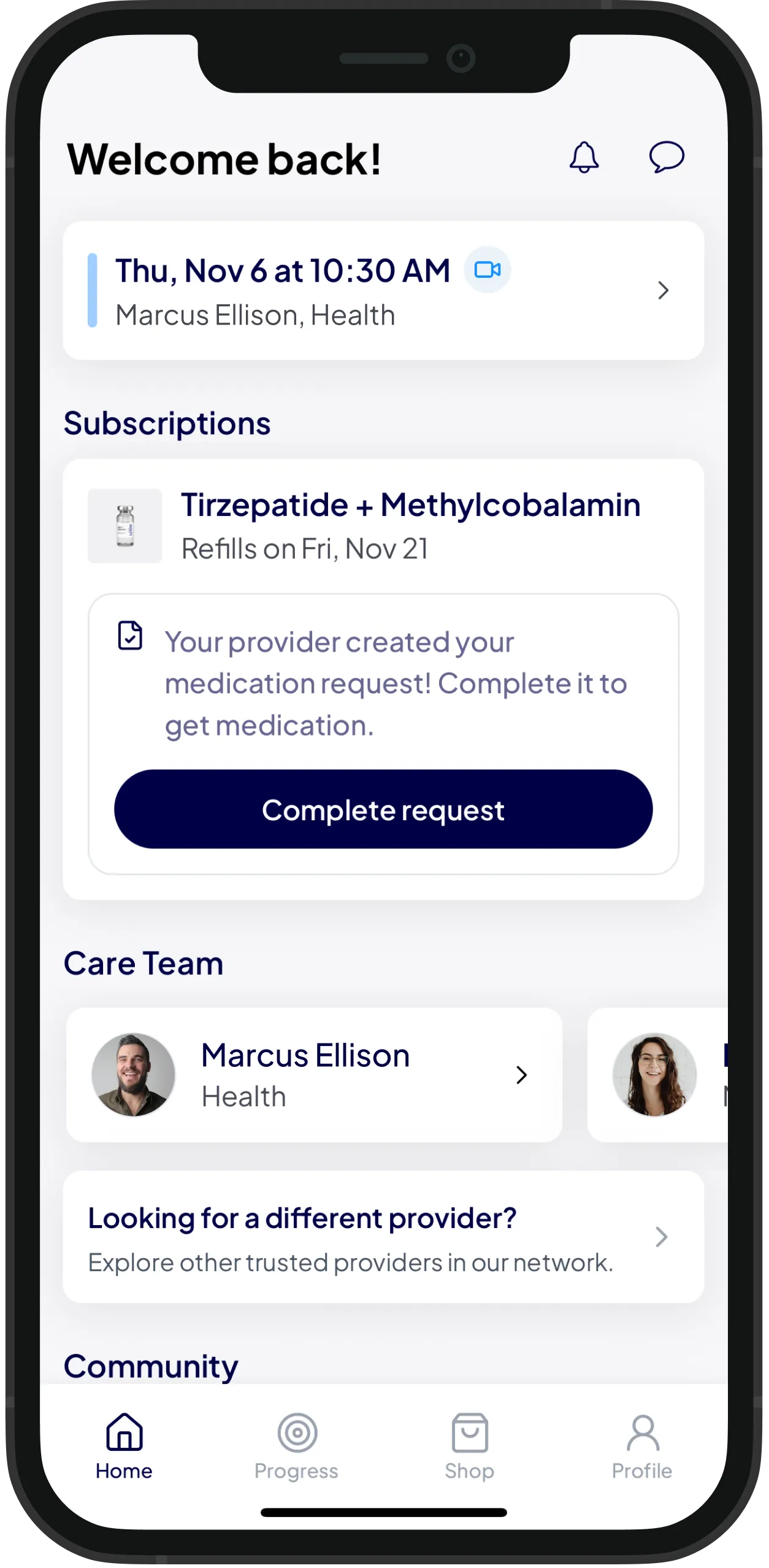Ready to transform your health?
Unlock access to expert guidance and a weight care plan crafted just for you.
Similar Articles
Similar Articles

How to Spot Fake Semaglutide: Safety Risks and Warning Signs
How to Spot Fake Semaglutide: Safety Risks and Warning Signs

Alternatives to BMI: Better Ways to Measure Health
Alternatives to BMI: Better Ways to Measure Health

Is Zofran Safe with Semaglutide? What You Need to Know
Is Zofran Safe with Semaglutide? What You Need to Know
Managing Weight During the Holidays: A Practical, Science-Based Guide from Mochi
Learn realistic strategies for managing weight during the holidays without extreme restriction. Explore GLP-1 friendly tips, simple nutrition swaps, movement habits, and mindset shifts that help you enjoy celebrations while protecting long term progress.

Table of Contents
Table of Contents
Managing Weight During the Holidays
Why Holiday Weight Gain Happens
Core Principles for Holiday Weight Stability
GLP-1 Specific Tips for the Holidays
Simple Food Strategies that Work
Movement, Sleep, and Stress
FAQs
References
Managing Weight During the Holidays
Why Holiday Weight Gain Happens
Core Principles for Holiday Weight Stability
GLP-1 Specific Tips for the Holidays
Simple Food Strategies that Work
Movement, Sleep, and Stress
FAQs
References
Managing Weight During the Holidays
The holiday season is a time for food, family, travel, and celebration. It is also a time when many people feel worried about weight, health goals, and the loss of their usual routines. Rich meals, dessert tables, alcohol, late nights, and stress can stack together in a way that makes healthy habits harder to follow.
Managing weight during this season is not about perfection or strict dieting. It is about leaning on a few small strategies that keep you from drifting too far from your normal habits. With a flexible plan, it is possible to enjoy the holidays and still feel in control of your health.
For people taking GLP-1 medications such as semaglutide or tirzepatide, the experience can be a bit different. Appetite is often lower, and large, heavy meals may feel uncomfortable. With some planning and simple food choices, GLP-1 therapy can actually make the holidays easier to navigate while keeping side effects manageable.
Why Holiday Weight Gain Happens
Research suggests that adults often gain a small amount of weight during the late fall and winter months, especially around major holidays, and that some of this weight is not lost afterward (Schoeller, 2014). This does not happen because of a single meal. It happens because many factors overlap for several weeks:
More calorie dense food
Larger portions and frequent snacking
Sugary drinks and alcohol
Less structured movement
Poor sleep and higher stress
The goal is not to avoid every cupcake or family dish. The goal is to prevent a long stretch of unchecked eating and inactivity. Small adjustments can protect your progress without making you feel deprived.
Core Principles for Holiday Weight Stability
Instead of tight rules, it can help to have a few guiding principles.
First, aim for maintenance or very gentle progress rather than aggressive dieting. Trying to diet very hard during a time that revolves around food and social events often backfires and leads to cycles of restriction and overeating.
Second, keep some structure in your days. That usually means regular meals, consistent hydration, and at least a small amount of movement most days. Even 10 to 15 minutes of walking can help.
Third, prioritize protein at most meals. Higher protein intake during weight loss supports fullness and helps preserve muscle mass (Wycherley et al., 2012).
Fourth, be selective rather than restrictive. Choose the holiday foods that truly matter to you and skip the ones you are eating only because they are there.
GLP-1 Specific Tips for the Holidays
GLP-1 medications slow stomach emptying and reduce appetite (Wilding et al., 2021). During the holidays this can be helpful, but it can also increase nausea if you eat very heavy meals. Some tips include:
Eat more slowly and pause between bites
Choose smaller portions of rich dishes and avoid very large, mixed plates
If you drink alcohol, sip slowly and combine it with food
If a big meal is planned, keep earlier meals lighter but still include some protein so you do not arrive starving
If you miss a dose because of travel or logistics, do not double up the next time. Follow instructions from your prescriber about what to do if a weekly dose is delayed.
Simple Food Strategies That Work
You do not need an elaborate holiday diet. A few simple patterns go a long way.
Try to start most meals with protein and vegetables. That might look like turkey and green beans, eggs and sautéed spinach, or grilled fish and salad. When your first bites are protein and plants, you are less likely to overeat starches and desserts.
Consider a flexible plate structure. For example, half the plate vegetables, one quarter protein, and one quarter starch or richer items. This is not a rule, but a visual target that keeps portions in check.
It also helps to avoid all-day grazing. Instead of picking at food every hour, build distinct meals and snacks. You can still enjoy holiday treats, but you are not constantly eating.
Movement, Sleep, and Stress
Physical activity does not need to be extreme to matter. Short, frequent walks can help regulate blood sugar and support digestion after larger meals (Colberg et al., 2016). Some realistic options include:
A 10 minute walk after big dinners
Choosing stairs over elevators when possible
Light hotel room exercises while traveling
Sleep and stress also play roles in holiday eating. Poor sleep is associated with higher hunger and increased snacking the next day (Spiegel et al., 2004). Stress can drive emotional eating for many people. Simple practices such as deep breathing, short breaks from social events, or a brief journaling habit can help prevent using food as the only coping tool.
Handling Setbacks Without Panic
Almost everyone will have days where they eat more than intended. That is part of normal life, not a sign that treatment has failed. What matters is your response.
The best next step is a return to routine. Take your medication as scheduled, eat a normal protein-containing breakfast the next day, drink water, and get some light movement. There is no need for punishment or extreme compensation. Most of the damage comes from giving up, not from one large meal.
FAQs: Managing Weight During the Holidays
How much weight do people usually gain over the holidays?
Studies have found that average holiday weight gain is often smaller than people fear, sometimes around one kilogram or less, but much of that weight is not lost later, so it can add up over the years (Schoeller, 2014).
Should I try to diet aggressively during the holidays?
For most people, aiming for maintenance or modest progress is more realistic. Very strict diets during a high stress, social period often backfire.
Is it safe to drink alcohol while on a GLP-1 medication?
Many people can drink small amounts, but alcohol can worsen nausea, dizziness, and reflux. Always check with your clinician and start cautiously.
What if I gain a few pounds by January?
Small temporary increases are common and often reflect water and glycogen as well as fat. The priority is to resume structure and long term habits rather than chase an immediate drop on the scale.
References
Colberg, S. R., Sigal, R. J., Yardley, J. E., Riddell, M. C., Dunstan, D. W., Dempsey, P. C., Horton, E. S., Castorino, K., & Tate, D. F. (2016). Physical activity/exercise and diabetes: A position statement of the American Diabetes Association. Diabetes Care, 39(11), 2065–2079.
Schoeller, D. A. (2014). The effect of holiday weight gain on body weight. Physiology & Behavior, 134, 66–69.
Spiegel, K., Tasali, E., Penev, P., & Van Cauter, E. (2004). Brief communication: Sleep curtailment in healthy young men is associated with decreased leptin levels, elevated ghrelin levels, and increased hunger and appetite. Annals of Internal Medicine, 141(11), 846–850.
Wilding, J. P. H., Batterham, R. L., Calanna, S., Davies, M., Van Gaal, L. F., Lingvay, I., McGowan, B. M., Rosenstock, J., Tran, M. T., Wadden, T. A., Wharton, S., Yokote, K., Zeuthen, N., & Kushner, R. F. (2021). Once-weekly semaglutide in adults with overweight or obesity. New England Journal of Medicine, 384(11), 989–1002.
Wycherley, T. P., Moran, L. J., Clifton, P. M., Noakes, M., & Brinkworth, G. D. (2012). Effects of energy-restricted high-protein, low-fat compared with standard-protein, low-fat diets: A meta-analysis of randomized controlled trials. American Journal of Clinical Nutrition, 96(6), 1281–1298.
Managing Weight During the Holidays
The holiday season is a time for food, family, travel, and celebration. It is also a time when many people feel worried about weight, health goals, and the loss of their usual routines. Rich meals, dessert tables, alcohol, late nights, and stress can stack together in a way that makes healthy habits harder to follow.
Managing weight during this season is not about perfection or strict dieting. It is about leaning on a few small strategies that keep you from drifting too far from your normal habits. With a flexible plan, it is possible to enjoy the holidays and still feel in control of your health.
For people taking GLP-1 medications such as semaglutide or tirzepatide, the experience can be a bit different. Appetite is often lower, and large, heavy meals may feel uncomfortable. With some planning and simple food choices, GLP-1 therapy can actually make the holidays easier to navigate while keeping side effects manageable.
Why Holiday Weight Gain Happens
Research suggests that adults often gain a small amount of weight during the late fall and winter months, especially around major holidays, and that some of this weight is not lost afterward (Schoeller, 2014). This does not happen because of a single meal. It happens because many factors overlap for several weeks:
More calorie dense food
Larger portions and frequent snacking
Sugary drinks and alcohol
Less structured movement
Poor sleep and higher stress
The goal is not to avoid every cupcake or family dish. The goal is to prevent a long stretch of unchecked eating and inactivity. Small adjustments can protect your progress without making you feel deprived.
Core Principles for Holiday Weight Stability
Instead of tight rules, it can help to have a few guiding principles.
First, aim for maintenance or very gentle progress rather than aggressive dieting. Trying to diet very hard during a time that revolves around food and social events often backfires and leads to cycles of restriction and overeating.
Second, keep some structure in your days. That usually means regular meals, consistent hydration, and at least a small amount of movement most days. Even 10 to 15 minutes of walking can help.
Third, prioritize protein at most meals. Higher protein intake during weight loss supports fullness and helps preserve muscle mass (Wycherley et al., 2012).
Fourth, be selective rather than restrictive. Choose the holiday foods that truly matter to you and skip the ones you are eating only because they are there.
GLP-1 Specific Tips for the Holidays
GLP-1 medications slow stomach emptying and reduce appetite (Wilding et al., 2021). During the holidays this can be helpful, but it can also increase nausea if you eat very heavy meals. Some tips include:
Eat more slowly and pause between bites
Choose smaller portions of rich dishes and avoid very large, mixed plates
If you drink alcohol, sip slowly and combine it with food
If a big meal is planned, keep earlier meals lighter but still include some protein so you do not arrive starving
If you miss a dose because of travel or logistics, do not double up the next time. Follow instructions from your prescriber about what to do if a weekly dose is delayed.
Simple Food Strategies That Work
You do not need an elaborate holiday diet. A few simple patterns go a long way.
Try to start most meals with protein and vegetables. That might look like turkey and green beans, eggs and sautéed spinach, or grilled fish and salad. When your first bites are protein and plants, you are less likely to overeat starches and desserts.
Consider a flexible plate structure. For example, half the plate vegetables, one quarter protein, and one quarter starch or richer items. This is not a rule, but a visual target that keeps portions in check.
It also helps to avoid all-day grazing. Instead of picking at food every hour, build distinct meals and snacks. You can still enjoy holiday treats, but you are not constantly eating.
Movement, Sleep, and Stress
Physical activity does not need to be extreme to matter. Short, frequent walks can help regulate blood sugar and support digestion after larger meals (Colberg et al., 2016). Some realistic options include:
A 10 minute walk after big dinners
Choosing stairs over elevators when possible
Light hotel room exercises while traveling
Sleep and stress also play roles in holiday eating. Poor sleep is associated with higher hunger and increased snacking the next day (Spiegel et al., 2004). Stress can drive emotional eating for many people. Simple practices such as deep breathing, short breaks from social events, or a brief journaling habit can help prevent using food as the only coping tool.
Handling Setbacks Without Panic
Almost everyone will have days where they eat more than intended. That is part of normal life, not a sign that treatment has failed. What matters is your response.
The best next step is a return to routine. Take your medication as scheduled, eat a normal protein-containing breakfast the next day, drink water, and get some light movement. There is no need for punishment or extreme compensation. Most of the damage comes from giving up, not from one large meal.
FAQs: Managing Weight During the Holidays
How much weight do people usually gain over the holidays?
Studies have found that average holiday weight gain is often smaller than people fear, sometimes around one kilogram or less, but much of that weight is not lost later, so it can add up over the years (Schoeller, 2014).
Should I try to diet aggressively during the holidays?
For most people, aiming for maintenance or modest progress is more realistic. Very strict diets during a high stress, social period often backfire.
Is it safe to drink alcohol while on a GLP-1 medication?
Many people can drink small amounts, but alcohol can worsen nausea, dizziness, and reflux. Always check with your clinician and start cautiously.
What if I gain a few pounds by January?
Small temporary increases are common and often reflect water and glycogen as well as fat. The priority is to resume structure and long term habits rather than chase an immediate drop on the scale.
References
Colberg, S. R., Sigal, R. J., Yardley, J. E., Riddell, M. C., Dunstan, D. W., Dempsey, P. C., Horton, E. S., Castorino, K., & Tate, D. F. (2016). Physical activity/exercise and diabetes: A position statement of the American Diabetes Association. Diabetes Care, 39(11), 2065–2079.
Schoeller, D. A. (2014). The effect of holiday weight gain on body weight. Physiology & Behavior, 134, 66–69.
Spiegel, K., Tasali, E., Penev, P., & Van Cauter, E. (2004). Brief communication: Sleep curtailment in healthy young men is associated with decreased leptin levels, elevated ghrelin levels, and increased hunger and appetite. Annals of Internal Medicine, 141(11), 846–850.
Wilding, J. P. H., Batterham, R. L., Calanna, S., Davies, M., Van Gaal, L. F., Lingvay, I., McGowan, B. M., Rosenstock, J., Tran, M. T., Wadden, T. A., Wharton, S., Yokote, K., Zeuthen, N., & Kushner, R. F. (2021). Once-weekly semaglutide in adults with overweight or obesity. New England Journal of Medicine, 384(11), 989–1002.
Wycherley, T. P., Moran, L. J., Clifton, P. M., Noakes, M., & Brinkworth, G. D. (2012). Effects of energy-restricted high-protein, low-fat compared with standard-protein, low-fat diets: A meta-analysis of randomized controlled trials. American Journal of Clinical Nutrition, 96(6), 1281–1298.
Read next
Ready to transform your health?
Unlock access to expert guidance and a weight care plan crafted just for you.

Ready to transform your health?
Unlock access to expert guidance and a weight care plan crafted just for you.

Ready to transform your health?
Unlock access to expert guidance and a weight care plan crafted just for you.


© 2026 Mochi Health
All professional medical services are provided by licensed physicians and clinicians affiliated with independently owned and operated professional practices. Mochi Health Corp. provides administrative and technology services to affiliated medical practices it supports, and does not provide any professional medical services itself.


© 2026 Mochi Health
All professional medical services are provided by licensed physicians and clinicians affiliated with independently owned and operated professional practices. Mochi Health Corp. provides administrative and technology services to affiliated medical practices it supports, and does not provide any professional medical services itself.


© 2026 Mochi Health
All professional medical services are provided by licensed physicians and clinicians affiliated with independently owned and operated professional practices. Mochi Health Corp. provides administrative and technology services to affiliated medical practices it supports, and does not provide any professional medical services itself.

















